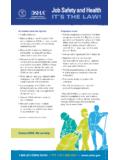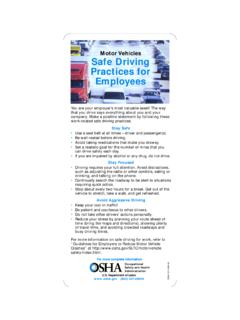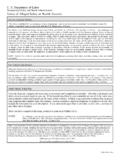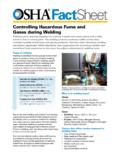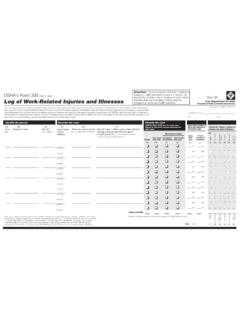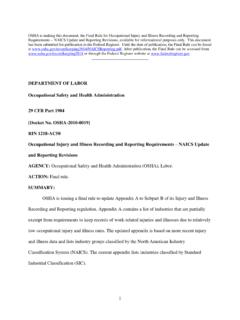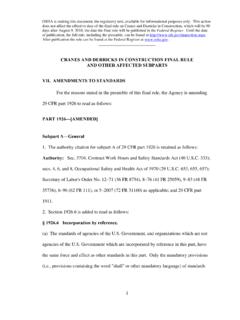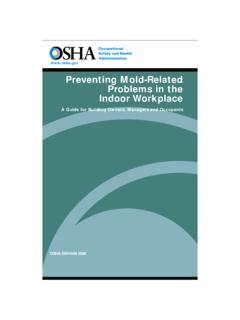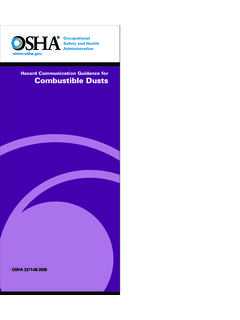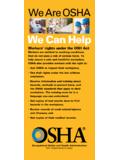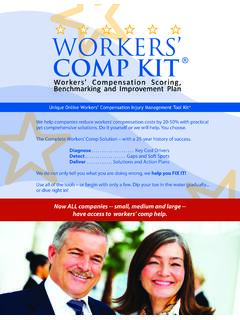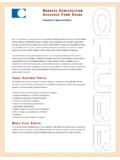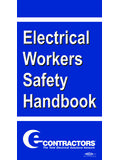Transcription of Temporary Worker Initiative - osha.gov
1 TWI BULLETIN NO. 1 Temporary Worker InitiativeInjury and Illness Recordkeeping RequirementsThis is the first in a series of guidance documents issued under the Occupational Safety and Health Administration s ( osha s) Temporary Worker Initiative (TWI). This Initiative focuses on compliance with safety and health requirements when Temporary workers are employed under the joint (or dual) employment of a staffing agency and a host a staffing agency supplies Temporary workers to a business, typically, the staffing agency and the staffing firm client (also known as the host employer) are joint employers of those workers. Both employers are responsible to some degree for determining the conditions of employment and for complying with the law.
2 In this joint employment structure, questions regarding which employer is responsible for particular safety and health protections are common. This bulletin addresses how to identify who is responsible for recording work-related injuries and illnesses of Temporary workers on the osha 300 log. Injuries and illnesses should be recorded on only one employer s injury and illness log (29 CFR (b)(4)). In most cases, the host employer is the one responsible for recording the injuries and illnesses of Temporary workers. Injury and illness recordkeeping responsibility is determined by supervision. Employers must record the injuries and illnesses of Temporary workers if they supervise such workers on a day-to-day basis (29 CFR (a)).
3 Day-to-day supervision occurs when in addition to specifying the output, product or result to be accomplished by the person s work, the employer supervises the details, means, methods and processes by which the work is to be accomplished. See osha FAQ 31-1 at (Essentially, an employer is performing day-to-day supervision when that employer controls conditions presenting potential hazards and directs the Worker s activities around, and exposure to, those hazards.) In most cases, the host employer provides this supervision. While the staffing agency may have a representative at the host employer s worksite, the presence of that representative does not necessarily transfer recordkeeping responsibilities to the staffing agency.
4 As long as the host employer maintains day-to-day supervision over the Worker , the host employer is responsible for recording injuries and non-supervising employer (generally the staffing agency) still shares responsibility for its workers safety and health. The staffing agency, therefore, should maintain frequent communication with its workers and the host employer to ensure that any injuries and illnesses are properly reported and recorded. Such communication also alerts the staffing agency to existing workplace hazards and to any protective measures that need to be provided to its workers. Ongoing communication is also needed after an injury or illness so the recording employer can know the outcome of the staffing agency and host employer must set up a way for employees to report work-related injuries and illnesses promptly and tell each employee how to report work-related injuries and illnesses.
5 In addition, employees, former employees, their personal representatives, and their authorized employee representatives have the right to access the injury and illness records (29 CFR ). In order to provide safe working conditions, information about injuries and illnesses should flow between the host employer and staffing agency. If a Temporary Worker sustains an injury or illness and the host employer knows about it, the staffing agency should be informed, so the staffing agency knows about the hazards facing their workers. Equally, if a staffing agency learns of an injury or illness, they should inform the host employer so that future injuries might be prevented, and the case is recorded.
6 As a best practice, the staffing agency and host employer should establish notification procedures to ensure that when a Worker informs one employer of an injury or illness, the other employer is apprised as well. The details of how this communication is to take place should be clearly established in contract note that osha law prohibits retaliation against a Worker for reporting an injury or illness. Further information on osha s recordkeeping requirements is available on the osha Recordkeeping website ( ). Further information on protecting Temporary workers is available at the osha Temporary Worker website ( ).Twenty-five states and two territories operate occupational safety and health programs approved by osha .
7 States enforce at least as effective standards that may have different or additional requirements. A list of State Plans is available at SCENARIOA manufacturer of metal cans, Metal Can Co., needs machine operators for a short-term increase in production. Metal Can Co. contracts with Industrial Staffing, a staffing agency, to provide machine operators to work shifts on a Temporary basis. Industrial Staffing hires ten operators with minimal knowledge of English and sends them to work onsite at Metal Can Co. The staffing agency also hires a person to act as the Temporary workers team lead who will translate the employers orders and any provided training, and perform administrative duties such as time and attendance tracking.
8 At the worksite, a supervisor from Metal Can Co. assigns each of the Temporary workers to a particular machine. The supervisor also controls and checks on the employees work throughout their shift. On their second day, one of the Temporary workers suffers a finger amputation injury from an inadequately guarded machine press. Who is responsible for recording this injury?Analysis:For recordkeeping purposes, Metal Can Co. must record the injury on its injury and illness log. The key fact in this scenario is that Metal Can Co. supervises and controls the day-to-day work of the Temporary employees at its facility. The team leader provided by the staffing agency is not empowered to modify or override the host employer s directions and therefore is not considered a supervisor under osha s recordkeeping regulation.
9 While Metal Can Co. should inform the staffing agency of the injury, the staffing agency should not record it on its own log because the injury should only be recorded on one set of injury and illness logs. Should Metal Can Co. refuse or ignore its duty to record, the company may be subject to an osha CAN osha help ?Workers have a right to a safe workplace. If you think your job is unsafe or you have questions, contact osha at 1-800-321- osha (6742). We can help . It s confidential. For other valuable Worker protection information, such as workers rights, employer responsibilities and other services osha offers, visit osha s Workers page ( ).The OSH Act prohibits employers from retaliating against their employees for exercising their rights under the OSH Act.
10 These rights include reporting an injury or illness, filing an osha complaint, participating in an inspection or talking to an inspector, seeking access to employer exposure and injury records, and raising a safety or health complaint with the employer. If workers have been retaliated against for exercising their rights, they must file a complaint with osha within 30 calendar days from the date the retaliatory decision has been both made and communicated to the also provides help to employers. osha s On-site Consultation Program ( ) offers free and confidential advice to small and medium-sized businesses in all states across the country, with priority given to high-hazard worksites.
